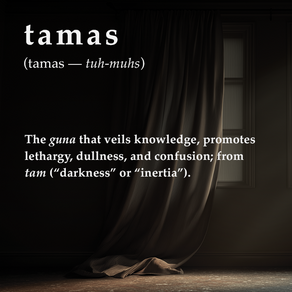top of page
ESSAYS
Search


Nirguna Brahman - Brahman Without Attributes — Pure Awareness
Nirguna Brahman is attributeless, infinite awareness — the absolute reality beyond qualities, identical with the Self.


Saguna Brahman - Brahman with Attributes
Saguna Brahman is Brahman with attributes, known as Ishvara — the personal God, worshipped in devotion and meditation, provisional but indispensable in spiritual practice.


Anirvachaniya - The Indescribable Status of the World
Anirvachaniya means indescribable — the world is neither ultimately real nor unreal, but provisionally real through the power of maya.


Manana - Reflection to Remove Doubt
Manana is reflective reasoning upon the Upaniṣadic teaching, guided by scripture, to dissolve doubts after listening.


Shravana - Attentive Listening to the Teaching
Shravana is the attentive listening to the words of the Upanishads as unfolded by a teacher, the first step in gaining self-knowledge.


Chitta - The Memory Function
Chitta is the storehouse of impressions and memory, one of the four functions of the mind. Inert and illumined by consciousness, it is not the Self.


Manas - The Doubting Mind
Manas is the aspect of mind that vacillates and coordinates sense impressions. Inert and illumined by consciousness, it is to be steadied, not mistaken for the Self.


Turiya - The “Fourth” — Ever-Present Awareness
Turiya is not another state of consciousness but the pure awareness underlying waking, dream, and sleep. It is the Self, ever-present and unchanging.


Vyavaharika - Empirical Reality
Vyavaharika is empirical reality — the shared world of everyday experience. Real for practical purposes, it is ultimately dependent on Brahman.


Viveka - Discrimination Between the Real and Unreal
Viveka is discernment — the ability to distinguish between what is eternal and what is temporary. It is the first and most essential qualification for Self-knowledge.


Vivarta-Vada - The Teaching of Apparent Transformation
Vivarta-vada is Advaita Vedanta’s teaching that the world is only an apparent transformation of Brahman, like a snake seen in a rope — the substratum is never truly changed.


Vishva - The Waker
Vishva is the jiva as the waker, identified with the body and senses in waking life. It is the microcosmic counterpart of Virat, the cosmic gross body.


Virat - The Universal Gross Body
Virat is the universal gross body — the entire physical cosmos seen as one living organism. It expands the seeker’s vision from individuality to totality.


Viparita-bhavana - Lingering Contrary Notions
Viparita-bhavana is the persistence of old contrary habits even after Self-knowledge — the feeling of smallness despite knowing one is limitless awareness.


Viparyaya - The Reversal of Reality
Viparyaya is maya's power of reversal — mistaking the finite body for the Self and the dependent world for reality. Self-knowledge corrects this inversion.


Vairagya - Freedom from Attachment
Vairagya is dispassion — the freedom that comes from knowing impermanent things cannot give lasting joy. It is not hatred or apathy, but clarity: engaging with the world without clinging or fear.


Uparati - Effortless Withdrawal
Uparati is the effortless withdrawal of the mind and senses from external preoccupation, leading to resting in one’s true nature.


Titiksha - Forbearance and Endurance
Titiksha is the capacity to endure life’s inevitable opposites with cheerful acceptance. It steadies the mind for inquiry and prepares the seeker for Self-knowledge.


Tamas - The Guna of Darkness and Inertia
Tamas is the guna of inertia, veiling, and heaviness. It obscures knowledge, breeds lethargy and confusion, yet also provides stability and rest. In Vedanta, tamas must be transformed into sattva to prepare the mind for Self-knowledge.


Taijasa - The Dreamer Self
Taijasa is the individual self in the dream state — inward-turned consciousness illumining a private world of vasanas. It points to the mithya nature of both dream and waking.
bottom of page